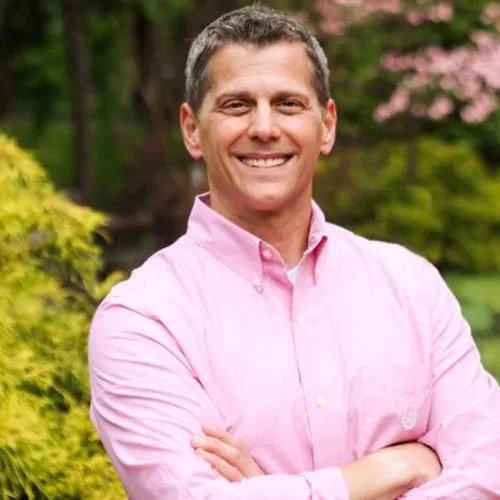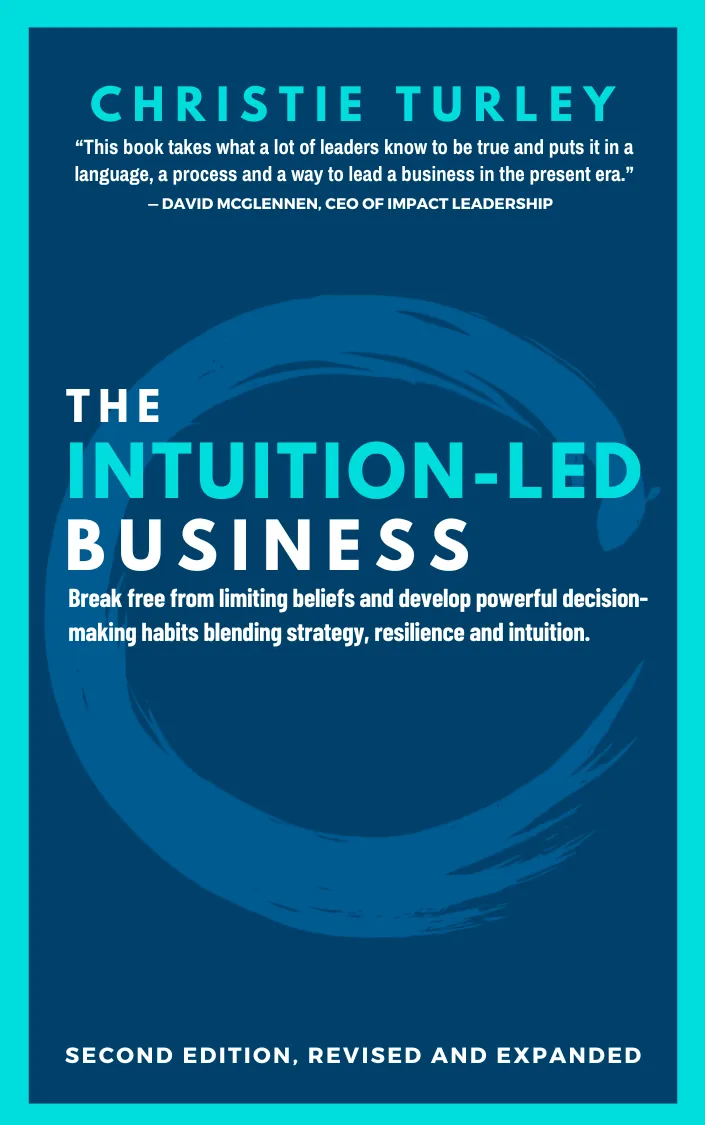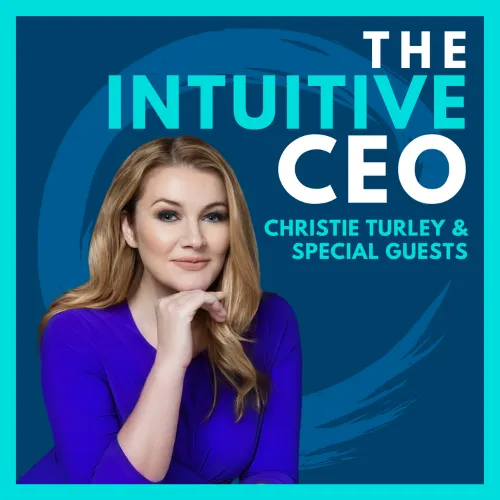
67: Measure the Immeasurable: Redefining Executive Metrics for a Fulfilled Life with David McGlennen
Are you a high achiever? Learn how to be intentional to bring out the best in your crave for achievement. Join me and David McGlennen as we discuss:
David’s systematic approach to growth
The intention of a morning ritual
The light side and the dark side of being a high-achiever
The difference between ego-driven and intuition-led achievement.
Watch on YouTube:
About David McGlennen
David is an executive coach who helps leaders learn to play the infinite game of business.
He helps companies integrate their desire for high performance, achievement and growth with a focus on developing a thriving culture through adopting a people-centric leadership approach.
He has trained leaders around the world as far north as the Arctic Circle and has shared the stage with John C. Maxwell while training in Paraguay, South America.
He has been married for 31 years and is a father of five children living in the Pittsburgh region.
David is a “recovering triathlete” and loves an active and healthy lifestyle.
LINKS:
David’s website, Facebook, Instagram, LinkedIn, Twitter
💡 Discover your #1 Money Block: http://ProfitGeniusPodcast.com/free
If you’re inspired by this episode, I’d love to hear your biggest Aha! moments. Take a screenshot of you listening on your device and post it to your social media and tag me, @christieturley!
Transcript:
Christie Turley
Welcome back! I’m your host Christie Turley, and today I’m speaking with David McGlennen. He is a coach, consultant, and CEO of Impact Leadership. And we will be talking about his systematic approach for growth, the intention of a morning ritual, the light side and the dark side of being a high achiever, and the difference between ego-driven and the intuition-led achievement. David McLennan is a business growth guide who helps leaders learn to play the infinite game of business. He shows those leaders how to integrate their high desire for high performance, achievement and growth while focusing on the things they value most. As an entrepreneur and family business owner for most of his life, he’s made the mistakes and yet loves getting out of his comfort zone to learn and grow. He’s coached and trained leaders around the world as far north as the Arctic Circle, and has shared the stage with Jhon C. Maxwell, while training leaders in Paraguay, South America.
He has been married for 32 years and as a father of five children living in the Pittsburgh region. He’s a recovering triathlete and loves an active and healthy lifestyle. Please join me in welcoming David to today’s episode.
Welcome David to the show!
David McGlennen
Thank you, Christie. I’m delighted to be here and honored!
Christie Turley
I am glad you’re here too! So let’s dive in. You are a high achiever, you help other high achievers. What makes you a high achiever? Where did you get started? How to start?
David McGlennen
Oh, gosh, uh, you know, it started early. Early in my career and probably even before that. What’s interesting is, I actually remember when I was probably in, I kind of think a second here, I probably was like, in seventh grade, I went to a jazz band concert at my local high school where I was going to be going in a couple of years. And I was in the balcony, I can tell you exactly where, I was right in the middle. I was in the balcony. And the jazz band, the first jazz band. So the top jazz band played. And I absolutely loved it, I was just really digging it.
And I said to myself, “I’m going to be on that stage. I’m going to be lead trumpet in that band.” And I don’t know why. But that’s kind of what, that’s where, at least where I feel like it’s almost started. And, you know, that’s what happened. Actually, I worked towards that. I practice an awful lot and became the lead trumpet in that high school jazz band. And so I think that, that kind of started it.
And then as I grew and went into college, I just felt like I had this insatiable drive to achieve and I became a partner with my dad. My, I was super goal oriented. I had goals written out, wanted to be a millionaire by the time I was 30. And all of these materialistic kinds of goals, very immature. But I think that that started the the ball rolling as it were.
Christie Turley
So interesting that you started in jazz. I don’t know if you’ve ever reflected on this before. I’m gonna pose something to you.
David McGlennen
Yeah, sure.
Christie Turley
So, I always find it interesting with my clients or people that I know, like, when they tell me their origin story. I always see seeds of wherever they got their start or well you mentioned, jazz. And where they are today. And,
David McGlennen
Yeah.
Christie Turley
The thing that occurs to me about jazz is, it has a rhythm about it that is not predictable sometimes.
David McGlennen
Yeah.
Christie Turley
Right?
David McGlennen
Yeah.
Christie Turley
And I wonder if you’ve ever made that leap or used a metaphor, a jazz metaphor in explaining what you do for clients, because I bet you,
David McGlennen
That’s so interesting.
Christie Turley
I bet you that you’re using your intuition. You, there’s one thing’s for sure. It’s uncertain, right? It’s exactly uncertain.
David McGlennen
Right.
Christie Turley
And this idea of improv.
David McGlennen
Yes.
Christie Turley
How does this play in? Get it? Play in.
David McGlennen
I love it! I love the pun.
Christie Turley
I cannot resist being punny. How does this play in to your current line of work?
David McGlennen
Gosh, Christie, that’s really interesting. And I don’t know that I’ve ever thought about it before. But it makes perfect sense. I mean, when you said it, there was something within me that was like, “Yeah, absolutely!” So, I do a lot of improv right now. I mean, anytime I’m with a client, I never know what’s going to come at me. I, in coaching situations, in group coaching, or my Emerging Leader groups, I don’t know what’s going to happen. I kind of have an idea. I might have a path or a pattern. But I don’t really know. And sometimes it ends up in a whole different place than I really originally planned. So that whole jazz idea, it kind of works! And it’s pretty interesting that you made that connection, I’d never have so, totally, totally get it.
Christie Turley
Well, and that goes to we can be blind sometimes to our own amazingness.
David McGlennen
Yeah.
Christie Turley
And think about there was something about that jazz that drew your soul to it, like you were like, “I’m going to be that. I’m going to do that.” And it was like, such this deep desire. And I want to just challenge you, like says,
David McGlennen
Yeah, I love it.
Christie Turley
I didn’t know you’re gonna talk about jazz. Like, I didn’t know that’s where you’re gonna start.
David McGlennen
I didn’t either.
Christie Turley
You know? So, we were improving. I would just challenge you to think about that. And is there some cool way that you can weave that into your brand?
David McGlennen
Yeah.
Christie Turley
Somehow in your messaging?
David McGlennen
I think there is. Yeah, absolutely. I really do. And it’s interesting, because the whole, I mean, jazz and music has been a part of my life for a long time. And it does, it makes me feel things and it’s, I can, matter of fact, my son is a professional musician. I just, a week ago, went to see him. Oddly enough, he’s in a jazz band. He’s actually in a professional big band. And he was playing at a local grill that is a jazz club or it’s actually a music venue. And just hearing him evokes all kinds of emotions within me. And I think that music for me, and maybe even yeah, jazz, is that conduit for feeling, and for emotion, and being able to kind of put things together. And so, what’s interesting is, I guess, yeah, I was, as I’m thinking about it, and maybe even processing out loud, that I’m putting things together for clients. And I may not necessarily know where it’s going to end up, but I’m improvising, and I’m asking this question, and I’m bringing these people together, and I’m helping them to process, and so, it is a bit of a creation process. And so yeah, I don’t know, I think that’s
Christie Turley
You’re the conductor! And you’re teaching other people to be wonderful conductors of their own orchestra, their own symphony, right?
David McGlennen
Absolutely, yeah!
Christie Turley
And so yeah, I think there’s so many ways you can go with that. So yeah, you know, my number if you want help with that.
David McGlennen
Absolutely!
Christie Turley
I love that. I love that stuff because I feel like that makes you so much more unique, it makes your brand stand out, it makes it memorable.
David McGlennen
Yeah, for sure.
Christie Turley
Especially when you can infuse symbolism into your messaging and your story.
David McGlennen
Yeah.
Christie Turley
It helps people remember who you are, your value, and how you can help them. So,
David McGlennen
Yeah, absolutely.
Christie Turley
So one of the things about your story, we kind of talked a little bit before and, I also, I did a podcast with your podcast, you guys have to check out your podcast as well. We’ll put the link in the show notes. So you talk a lot about, I mean, what you do is you help people grow their business, you help them grow themselves so they can grow their business. One thing that doesn’t get talked a lot about is the crash and burn that can happen.
David McGlennen
Yeah, so true.
Christie Turley
And you talk about this freely, you know you’ve crashed and burned several times, I know a lot of people that don’t want to admit that.
David McGlennen
Yup.
Christie Turley
Especially a lot of gurus that talk about growth, growing businesses or scaling a business, they don’t want to talk about the failures. It’s inevitable, right?
David McGlennen
Absolutely.
Christie Turley
Especially growing!
David McGlennen
Yeah.
Christie Turley
Let’s talk about that, like you,
David McGlennen
Sure!
Christie Turley
You were blind to these signs before you crashed and burned, and blind to some of the signs that kept you working in your business and slaving away when you thought it would be so fulfilling?
David McGlennen
Yeah. Yeah, it’s kind of like the dark side to achievement. I think and not too many people talk about it. And, you know, for me, one of the things that happened is I got involved in a startup business, which was amazing, it was great. I loved being a part of it, because that part of me that achievement, part of me was just, came alive. But, as I got into it, and as I got focused on that business, and my part of that business, I, it’s kind of like I put blinders on. And I missed a lot of things. And it really, it didn’t even occur to me, until, I call it my midlife awakening. It’s like I had this moment in time, when I recognized how much I was missing in life, by going so fast and so furious, and being solely focused on doing rather than the being and I really came to this point where I knew something had to change. And as fate, luck, whatever you want to call it, would have it, you know about this time, when I was beginning to have some of this awakening, and really having my eyes opened, the company that I was working with brought in private equity, to be able to take the company to the next level, you know, sometimes we have to do that in business, we need some infusion of cash to be able to go to that next level. And again, the achievement part of me, I was like, “Yes, this is great!” But, something really told me that I really needed to sell part of my shares of the company that I had. And that would then somehow, maybe, like open things up for me, and I couldn’t even, I’m articulating it now, but it because it’s in hindsight, but then I didn’t really know, I just knew that, I knew I needed to sell part of my shares. Well, I did that. And what that did for me is over the next year, I really did a lot of just introspection, a lot of thinking, and lot of journaling, and I came to the place where I knew that I needed to leave that business and start the business that I am in today. And interestingly enough, as we’re recording this, my six year anniversary is coming up in July. And so i, that process helped me to see some of the things that I hadn’t seen before. Like, you know, my kids needed me. They, my kids were growing up, and I was missing a lot of different things. It’s interesting. So, one of the eye opening experiences that I had, I was on the tarmac, actually, I wasn’t even in the aircraft yet. I was in LaGuardia Airport, not exactly which airport. I was waiting to come home. And I was on a business trip coming home, and I was trying to get home in time to see my son’s concert, the same one I was just talking about. And all of a sudden, the lady on the PA says, “Hey, we’re gonna have a little delay. There’s a slight maintenance issue,” blah, blah, blah. And I’m like, Okay, well, long story short, it wasn’t that long. We got back in, we got in the plane, and started taxing out, the pilot came on and said, “Hey, ladies and gentlemen, Thanks for your patience. Because of the delay, we’re going to have a little bit of a delay in taking off. But sit back, relax, you know, we’re 34th in line to take off.” And I’m like, “Oh my gosh, 34. I know what this means.” And so in my mind, I’m just kind of projecting ahead. And long story short, I finally did get home. But I missed the first half of the concert, you know, and that was in that moment that I thought to myself, “something’s got to change and something will change.” And that’s really when I made the decision to talk to our CEO and tell him what I’ve been thinking about, and creating the business that I have today.
Christie Turley
It’s so important. I’m so glad you brought this up because, the military actually has a saying that “slow is smooth and smooth is fast.”
David McGlennen
Smooth is fast. Yeah.
Christie Turley
And I think as high achievers we value the quickness.
David McGlennen
Yeah. Yeah, for sure.
Christie Turley
And we don’t realize this counterintuitive move to slow down, enjoy life, enjoy the fruits of your labor.
David McGlennen
Exactly, exactly. Yeah. And it’s interesting, because I feel like I’m, you know, in some ways, I’m just now learning that, you know, and it’s, it takes a little time. I think achievers have to crash and burn sometimes, maybe not all of them, but at least I did. I, you know, and I had to really make a bold move and, you know, hit an email, resigning my position and then starting, you know, Impact Leadership Consulting. So.
Christie Turley
Yeah, that’s, that takes guts, right? That takes a lot of courage to do that. And thank goodness you did, because your life would be totally different, you would be on a completely different trajectory.
David McGlennen
So true. Yeah, I mean, you and I probably wouldn’t have met.
Christie Turley
Right.
David McGlennen
And I think that there are certain points in our life when we look back, and even in the moment, we know that there’s, for example, hitting send on that email to our CEO. Even though I had had dinner with him, you know, a couple of weeks beforehand, he knew what was going on. It wasn’t official until I pressed send. And when I pressed send, I went, “Oh, dear Lord! What did I do?”
Christie Turley
Yeah, and that’s, I think that’s completely natural too. Completely normal. I’d like to go back to this part that you were mentioning in your story, how you said you had this intuitive guidance or your intuition speaking to you to sell the shares?
David McGlennen
Yeah, yeah.
Christie Turley
What was the results of that? Like, was the timing critical?
David McGlennen
It really was, I mean, the timing was really critical, because what happened is, the private equity came in, transaction closed, I did sell half of my shares. And from there, the business was missing, it started missing its goals, and missing the sales goals and the numbers. Some of the pipeline didn’t come to fruition. And so a year later, the, I actually, a year later, was ready to start my business. And I told our CEO that I wanted to sell the rest of my shares just to kind of make a clean break. They actually were my first client, they were my first corporate client. So, but back to your question. Like, when I sold the second part of my shares to one of the, I think it was one of the board members at the time. They weren’t. They weren’t worth nearly as much because we had to go through some of that, you know, some valuation stuff and, and so the timing was impeccable. I only wish I would have sold all of them at the outset. But that would have probably set the wrong tone or the wrong message. But, and even for me, what it helped me to be able to do was become debt-free, and pay off a lot of, you know, a lot of debts, and it set me up for being in a great position for my business financially.
Christie Turley
That’s amazing. Yeah. Sometimes, you know, our intuition is very patient with us, you know, it’ll keep reminding us until we listen.
David McGlennen
Yeah.
Christie Turley
Or until the time has passed to listen. And, I mean, in this case, it sounds like you sold half at the peak, and half at you know, maybe not as great of a time but you know, whatever.
David McGlennen
You’re right.
Christie Turley
But I mean, that was integral, it sounds like for your trajectory of where you’re at. And,
David McGlennen
It was.
Christie Turley
You really, you practice what you preach, you know, you help people become the best version of themselves. This is what you say on your website so that they can enjoy the best version of their life.
David McGlennen
Yeah.
Christie Turley
And I mean,
David McGlennen
Yeah!
Christie Turley
Think about that time travel machine. If you had to go back into time, and you chose a different path?
David McGlennen
Yeah.
Christie Turley
Would you feel like that’s really your, the best version? I mean, I feel like we’re always at this critical juncture, like this critical choice between, you know, the path by default and the path of like destiny or like this last version. So, you have this systematic approach for this, and I would love to know more about like, what is that systematic approach to grow?
David McGlennen
Yeah. So it really is sitting down and looking at things like our morning rituals, our habits, because I’ll often say, we don’t get our goals, we get our habits. And so, when we think about the things that we’re doing, that’s kind of like the second step. And you already know this, but the “Be-Do-Have” model, you know, who do we need to be so that we can do the things that we need to do and have the things we want to have? I really help my clients work through this. And the first place that we start is their morning routine, their morning ritual. What is it that they need to be in the morning, who do they need to be in the morning so that they can set their day upright? So essentially, that’s the first step. But then we evaluate every area of their life. And you’ve probably seen this before, but it’s, you take the kind of the wheel of life and whether it’s your financial, your spiritual, your health. And when we taught, we talked through where they think they are on that wheel of life, you know, scale of zero to ten. And we make some assessments, and then we start with whatever area they feel like they want to start in. And then we’ll go from there and begin to create their life, the way that they want it to be. What do they want it to look like? I have them do some visualization, have them do some journaling. And it’s so funny, because one of my clients, is a emerging leader in a company that I work with, and when, he even told me, said, “Dave, when you told me to start journaling, I thought, No guy journals! Are you kidding me?” And, but he said, “but I did it. And now I don’t know what I’d do without it, because it helps me to process my thoughts, my feelings, the things that are happening to me.” So really, I look at, you know, morning routines, morning rituals, I look at my, our habits, and a big thing for me is health. Not just physical health, but spiritual health, emotional health. And I think it all plays together. And so, I really just kind of walk through each of those areas of life with my clients, and help them to be able to establish some healthy habits in those areas.
Christie Turley
That is wonderful! Um, can you give an example like, not naming names, you got to keep things confidential.
David McGlennen
Yeah, sure.
Christie Turley
Like you mentioned, ’cause we talk about intuition, that’s a spiritual word, right?
David McGlennen
Yeah. Right.
Christie Turley
Will you talk about spiritual health, or like some spiritual habits that maybe people have that aren’t so great? And then like, what kind of habits do they then transform into? What are the good spiritual habits that they have? I mean, imagine, the morning rituals one, right? But what else?
David McGlennen
Yeah, that’s, I mean, for sure. I mean, an even part of that morning ritual. You know, there are a lot of people who may even have kind of a morning ritual, but they don’t really take the time to, let’s say, pray. And if that’s part of their practice, and actually taking the time and making the time to walk through that practice, and even preparing themselves to do that. I think that so often, some of the clients that I’ve worked with, they just jump in the car, they grab their coffee, they jump in the car, and they get going. And part of their ritual, might be like throwing on a podcast. That’s great, that’s good. But they’re starting their day with not really intention. And so part of the ritual, part of the morning ritual is, just what are your intentions? Write down three things that you want to, that you intend for the day. So, I’m not sure if I’m answering your question.
Christie Turley
That was amazing. Yes! I think we can all relate to that ’cause at some point in our lives, we didn’t have a ritual.
David McGlennen
Oh yeah.
Christie Turley
Maybe we still don’t, and no judgement.
David McGlennen
Yeah! Right.
Christie Turley
Theres no better time than the present. Right?
David McGlennen
No doubt.
Christie Turley
And so, can you share with us, like what do you do for your morning ritual? Maybe that will give
Yeah, sure.
some people some ideas of, maybe something they’re not doing currently.
David McGlennen
Yeah, well, and what’s interesting about my morning ritual is I actually like to kind of tweak it now and again.
Christie Turley
Yeah, I do too.
David McGlennen
And so, yeah. So the first thing I do is I come down to my office, I have my morning chair, my reading chair, and I will take some time just to meditate. And I find that that first, like few minutes of the day, or of the morning ritual, is kind of where I just like to observe my thoughts. I like to like, find out what’s coming up for me, what’s passing through my mind. And so I take, you know, sometimes it’s only five minutes, sometimes it’s 15 minutes of time, just to really notice. And then, I do some reading. So I’m a Christian. So I read the Bible, I have a Bible app. It’s so convenient. And so I, you know, do my morning reading, then I have my prayer time. And then I journal and I’m big journaler. I never used to be really consistent, until the last probably six or seven years. And I’m very consistent now. What I found about my journaling practice is that, there’s something magical that happens from the thought going out to your hand and writing it down. And I’m an advocate of a handwritten journal, because I just think there’s something magical about that. But what I found is, is that as I’ve written things out, and sometimes it’s stream of consciousness. Sometimes I’ll even start like, I’d really don’t know what to write this morning. But and then as I start to write that, then something else spurs and then something else, and at least is something else. And then I’ll go back, and I look at it, and I’ll go, “Wow, that was really interesting. Like, I didn’t, like, where did that come from?” So anyway, so my journaling practice. And actually, I just started something about a month ago, another journal, normally I just freeform. But I actually tried this journal. It’s specifically designed for men, called Mind Journal, and it’s pretty cool, because there’s kind of a format, there’s like three phases, and I think I’m in the, I’m just getting ready, start the third phase. But it’s kind of interesting, it just kind of, you know, switch things up for me. So after my journaling, then that’s time for me to kind of put into my own mind. I’m an avid reader. So I, that’s my reading time. So I have at least a book, if not several books that I’ve got going. And that’s my reading time. And, you know, some days if I, maybe I’m a little shorter on time, I’ll compress that. But that’s essentially my morning ritual.
Christie Turley
I love that. It’s so important to do!
David McGlennen
Yes.
Christie Turley
And I do think that you can have different versions of the morning ritual. It doesn’t have to be the same thing.
David McGlennen
Right.
Christie Turley
It can be a five minute version you can have, how long do you take? It sounds like an hour?
David McGlennen
Yes. So I’m in kind of in a different season in my life. So sometimes it’ll be two hours. I get up early, so I’m up by five, if not before, and so I can take some time. And to me, that’s the “Me Time,” and I literally build it into my calendar. So if you look at my morning, my calendar, my planner, 5am – it’s my morning ritual, and it goes from five to seven. Occasionally, I may have a meeting that starts at seven, I’ve got one senior executive that I coach that he likes to get started early. So I may stop it by 6:30. But yeah, so I take it to pretty much two hours. But it’s, again, it’s my time. I’ve built it into my calendar. You don’t have to do that if you’re listening. You might think, “Holy cow, I don’t have two hours!” Just remember, I’m in a different season of my life. And I think, you know, you and I talked on my podcast about Seasons. And so, I think we have to recognize what season we’re in. And if you only have 20 minutes, take the 20 minutes but I would challenge you, get up earlier and make the time because you’ll never regret it. Some of my best moments are in the morning and in that quiet and even in the darkness. It’s really special, that time is really special. And personally for me, a lot of times that’s when I hear from my intuition. That’s when I’m hearing things, I’m feeling things, and sensing things and so, and that’s part of my journaling practice, too. So, anyway.
Christie Turley
I love that so much! Everyone, take us up on this advice, please.
David McGlennen
Yeah, for sure!
Christie Turley
Whether it’s five minutes or couple hours. Like, the investment in yourself, in your day, I feel like, there’s exponential rewards from that. Like that little investment of time, I feel like for me, tell me your experience. But for me, I feel like I’m so much more productive. Like, if I invest 15 minutes, I feel like I could get two hours back in creativity and productivity. And also just like, being able to harness an opportunity I might not have seen because I noticed it in my morning ritual. And I thought about it and took that time to think about how my life is going, you know?
David McGlennen
Yeah, just to take an assessment. I mean, I think that too often, again, people are moving at the speed of sound or the speed of light. And we’ve got to slow down. And this is my, in a lot of ways, this is my conscious way to slow my achiever mentality down and to be able to really be intentional. One of the books that I read at that kind of at that pivotal time was Intentional Living by John Maxwell. And that book, really kind of, there’s something in it that just kind of clicked with me, that I needed to be a lot more intentional with the way I was living my life. And that for me, the ritual, the morning ritual was the first way that I could say, “Look, this is my time. I’m carving this out for me, because it’s my life. And if I’m going to be any good for my family, my wife, my kids, I need to be the best for me. And I need to be the best me that I can be.”
Christie Turley
Yeah, and for achievers, this is good. This is a good benefit statement right now. You need to be the best that you that you can be right?
David McGlennen
Absolutely.
Christie Turley
Let’s talk about achievement. Because I mean, I relate to this so much. I feel like I’m a high achiever, you’re a high achiever. Let’s just talk between us high achievers, and all the other people that are talking, here listening to us. There’s a light side to achievement. And there’s a dark side to achievement.
David McGlennen
Yeah, yeah, for sure.
Christie Turley
Let’s talk about this. I mean, you can choose if you want to talk about light or dark first.
David McGlennen
Yeah.
Christie Turley
But what are some of these habits, good or bad, that achievers have?
David McGlennen
So the first thing that comes to my mind is just speed. Like, for me, I’ve been a fast-paced person, probably most of my life. And that’s, I think that can be a light side. I mean, that could be the good side. I mean, you know. It gets stuff done, right? The dark side of that, though, is you miss a lot of things, too. You know, there’s a lot of cool things that when you’re going 100 miles an hour, they’re flying by you and you miss them, and it’s like, “Oh, wow, I never noticed that.” So anyway, that’s the first thing that kind of comes to my mind.
Christie Turley
That’s so good, so good!
David McGlennen
Yeah.
Christie Turley
Yeah. You know, and it’s important, really to just ask yourself, “What is this costing me?” You know.
David McGlennen
Yeah.
Christie Turley
What is it costing me?
David McGlennen
Right.
Christie Turley
You know, there’s some good parts to it, I get more done than most humans.
David McGlennen
Right, right. Yes, exactly.
Christie Turley
And some and like, Ferris Bueller had a quote on Ferris Bueller’s Day Off. It’s like, “If you don’t,
David McGlennen
Ah, yes!
Christie Turley
“If you don’t stop once in a while, I’m gonna mess it up.” My husband would quote these.
David McGlennen
Yeah.
Christie Turley
Like, off the top of his head, but, “if you don’t look around once in a while, you might miss it” or something.
David McGlennen
Exactly.
Christie Turley
And that’s exactly what you’re saying. I mean
David McGlennen
Yeah. Oh, yeah, for sure. Yeah.
Christie Turley
If you recognize that, or you’d be on this other path too.
David McGlennen
No doubt. Yeah. Well, and I think it helps to have a wife that helps me to see my blind spots. I mean, really, honestly, I mean, I think that that’s how, it’s helped me to have a partner who does help me see my blind spots. But it’s also been an awakening for me to listen to her as well. Because sometimes that dark side of the achievement is like, I have my eyes set on this goal. And that’s all I want to see. And that’s all I want to hear. And you kind of tune everything out. And so I’ve been, you know, very blessed to have a wife that has helped me. Sometimes gently, sometimes not so gently. Which I needed!
Christie Turley
Yeah, that tunnel vision is a real thing! For sure.
David McGlennen
Oh, yeah, for sure.
Christie Turley
Yeah, I feel like um, there’s this other question I want to ask you that just kind of came to me. And it’s like,
David McGlennen
Sure.
Christie Turley
So, achievement. We’ve talked about light and dark side. Well, let’s look at it with a slightly different lens. Since this is the Intuition-Led Business Podcast.
David McGlennen
Yeah. Yeah.
Christie Turley
What does it look like if you’re an achiever coming from your ego? And what does it look like if you’re an achiever coming from intuition?
David McGlennen
Oh. Gosh, that’s such a great question! You know, the first thing that flashed through my mind is coming from your ego it’s, it’s all about me. “What do I get? What is it going to give to me?” As opposed to when it’s coming from my intuition is, “What impact is it going to have? Who could this help? How is this going to help?” And I think that’s the, I mean, that’s the first thing that I think of is, when I think of ego, I think of me. And it’s, it’s just for, it’s just for the money, it’s just for the notoriety, it’s just to be able to kind of put the arrow in my quiver, so to speak. As opposed to, when you’re using your intuition. It’s more about “Who is this gonna help? How is this going to help more people, more companies? Help grow others?” As opposed to just focus on yourself. That’s what comes to me. What about for you?
Christie Turley
Yeah, I completely agree with what everything you said. And the additional thought that came to me was, you know, when you’re using your intuition, it’s not, it’s just what you said, as well. It’s also about really making sure that you’re acting in the highest good. Like what, like, for others, but also for yourself. Like, it’s not just about others. It’s also about yourself too.
David McGlennen
That’s true.
Christie Turley
Like, “What you came here to do?” And if like, you know, “If you don’t have your health, what do you have?”
David McGlennen
Exactly. Yeah.
Christie Turley
Taking care of yourself. So “What’s in the highest good of others?” “What’s in the highest good of myself?” You know, “Is this the best thing I could be working on right now? Is this the best use of my energy? I know, I could do many things and do them fast. But is this the best use of my energy? Or would I better serve others or better serve this particular project?” If I were working on something different and tuning in to your intuition, as well just like, ask yourself that, like, ask yourself. And really listen to the answer. Like, “Is this the best use of my time? Am I doing what my heart desires to do?” And I feel like that almost like rips away that tunnel vision that we talked about earlier.
David McGlennen
Yeah, for sure.
Christie Turley
Because I feel like you’re just so much more aware of other people, of how this project might affect another project, how this decision might affect the team, the customers. I just feel like, all around. I mean, it’s using your achievement as a superpower!
David McGlennen
Yeah, yeah, absolutely. Well, and I like what you said too, about kind of tuning into that so that sometimes we need to be good to ourselves and we need to achieve for our higher good because then we can help other people more, and it kind of is a momentum thing.
Christie Turley
I had a business coach tell me once, and she’s now passed away, which is sad, but I miss her a lot. But she said every time like something cool would happen, like achievers sometimes want validation from other people. Like, “Good job!”
David McGlennen
Yes.
Christie Turley
“Yay!” Like they’d say something we want, right? We want that validation. And so, I would share something. And I think that’s important. Everyone, if you’re an achiever, like, to have someone to share these things with, that’s safe. You know?
David McGlennen
Absolutely.
Christie Turley
That they don’t think you’re bragging. It’s just like, “I did this!”
David McGlennen
Right, right.
Christie Turley
And she would do that. And it’s like, you know what, more important than getting the validation from her, she would always say, “Take a win!”
David McGlennen
Mm hmm.
Christie Turley
“Go take a win.” And how she defined the win, or the, like taking a win. It could be anything from going to the coffee shop to get your favorite drink, or going for a drive just wandering, you know, exploring, or it could be like buying yourself like something a little nicer.
David McGlennen
Sure.
Christie Turley
And her point was, if you don’t take the win, you know, if you’re just achieving for the sake of achieving and you’re not actually, there’s not some kind of like tangible reward other than a pat on the head or a pat on the back. “Good job.”
David McGlennen
Right, right.
Christie Turley
Then, you come to a point where eventually you’re like, what is this all for?
David McGlennen
Yeah.
Christie Turley
What is this all for? Do I feel fulfilled?
David McGlennen
For sure, yeah. Yeah. And there’s a lot to that and then there’s a lot to being fulfilled and really making, you know, and some ways, making that the kind of the benchmark, so to speak.
Christie Turley
Yeah, exactly. It’s like using fulfillment as the ruler, the measuring tape as opposed to your bank account.
David McGlennen
Yeah.
Christie Turley
Or your sales goals.
David McGlennen
Right, right. Yeah, absolutely.
Christie Turley
How do people measure that? Like, how would you? Like, do you teach people that? Like, how would they even go about, like, “Am I fulfilled?” Like, “Can I measure that on a chart?” Like,
David McGlennen
Yeah, yeah, that’s so hard, and because there’s a lot of stuff, there’s a lot of things that I do with clients that you can’t really, like, measure it on a scale other than a subjective scale, you know? “Scale of one to 10. How fulfilled do you feel right now?” Yeah, and it’s, that’s valid. But I think that sometimes there are things that we can’t measure. You know, objectively, it’s got to be kind of, come from within. And yeah, so I don’t necessarily come up with like KPIs like, how are you gonna?
Christie Turley
Would it be cool if you did, though?
David McGlennen
I know, I know. “What’s your KPI for fulfillment? What’s the KPI for being,
Christie Turley
You kind of do that feel of life thing, which kind of shows people where they’re out of balance, and
David McGlennen
That’s true.
Christie Turley
If they can rebalance, then that is a step towards fulfillment, right?
David McGlennen
Yeah, that’s true. That’s true. Well, I mean, and one thing that I do, do is that when I’m working with a client, in culture work, so one of the things that I do, and this is very systematic as well, is that we will define the culture in terms of behaviors. So we’ll come up with a set of behavioral statements, I call them fundamentals, because they’re fundamental to the success of that organization. And then we create rituals so that they can practice those and what I mean by a ritual, it’s just anything that’s worked into the day on a daily routine set that helps them think about, talk about, and incorporate those behaviors into the day. And so and there’s some more to that, too. But then what we’ll do is we will create a survey. And survey both internally, the employees, the vendors, and you know, any, I mean, any other stakeholders that, and how, and we’ll ask the question, “How well, is XYZ company living up to practicing blameless problem solving?” Or “How well is XYZ company listening generously or being a fanatic about response time?” Different things. And so in that way, we can kind of measure some things about how well we’re doing, in a way in something that’s typically not measured. I mean, like, how do you measure culture? Well, that’s kind of one way that least I found that to try to measure it. So I know that’s not what you asked. But that kind of came to my mind. And it is a way that you can measure the immeasurable, and (inaudible).
Christie Turley
Yeah, I love that. “Measure the immeasurable.” Like, that sounds like a good tagline right there.
David McGlennen
I’m not sure. I’m glad you stumbled on it.
Christie Turley
Yeah, that’s, I mean, seriously, because that’s what we’re talking about here. When we’re achievers, we like to measure things. We measure our success by how many things we ticked off our to do list today, or how many different trophies we’ve obtained? You know?
David McGlennen
Right, right.
Christie Turley
And maybe, the lesson for all of the achievers is to learn to measure the immeasurable.
David McGlennen
Yeah. Interesting. Yeah. Interesting. Yeah. Coming up with, yeah, finding the way to do it. Finding the way to measure that immeasurable.
Christie Turley
Yeah, and what is the immeasurable? It’s those unseen, intangible parts of your life that probably do create fulfillment.
David McGlennen
Yeah.
Christie Turley
Some of them are meaningless, rubbish. But some of it, probably helps create fulfillment.
David McGlennen
Right, right. Well, and it’s funny, as I was thinking about that, and as we’re just kind of in that pause, the thing that came to my mind is, maybe you start to count like, “How many days have you really taken off? How many days have you spent in reflection or doing something that, like fills you up?” A hobby, what have you. I know in your book, you talk about the eight. It’s the Rule of Eight, I think it’s what you call it.
Christie Turley
Take 8, yeah.
David McGlennen
Yeah, Take Eight. Yeah. And you know like, maybe that’s where we start to say, “Well how many of those have I done? You know, and maybe every quarter I’m going to take, I’m gonna take one day and I’m just going to do that. I’m going to do the Take Eight. I don’t know, it just kind of some thoughts that kind of popped in my head.
Christie Turley
Yeah something for you to ponder in your morning ritual! Like, I mean, I’m very intrigued actually by that. I’m very intrigued because it’s like, what are those immeasurable things? What are the things I’m not measuring right now? That maybe I need to be, you know?
David McGlennen
Yeah, right!
Christie Turley
For a better life! To become the best version of myself and have the best version of my life, you know, so.
David McGlennen
Yes, absolutely.
Christie Turley
It is been so fun to have you on the podcast today!
David McGlennen
Aww, Christie, it’s been a pleasure. I really have enjoyed this conversation. It’s, you’ve really made me think of a lot of things and it’s been fun. It’s been really enjoyable.
Christie Turley
Well tell everyone how they can get in touch with you, and after you do that, I would love for you to share one last nugget of wisdom. Just something quick.
David McGlennen
Yeah!
Christie Turley
Quote, whatever you want it to be.
David McGlennen
Sure. Okay. So you can get in touch with me either through my website, DavidMcGlennen.com, or you can connect with me on LinkedIn. That’s kind of my primary social media platform. And then as far as last little tidbit, I think, that first of all, I think I’m gonna go back to the quote that you use that, “Slow is smooth and smooth is fast,” and I think that that, for me is really, it really resonates. And I think that I would just kind of reiterate that to achievers, that sometimes we do have to slow down so that we can be more effective and I don’t even want to say go faster, but I think that it may be that we can go faster, but just be more effective. And so to the extent that you can slow down and be more intentional. I think that’s where you’re going to make the bigger impact.


















